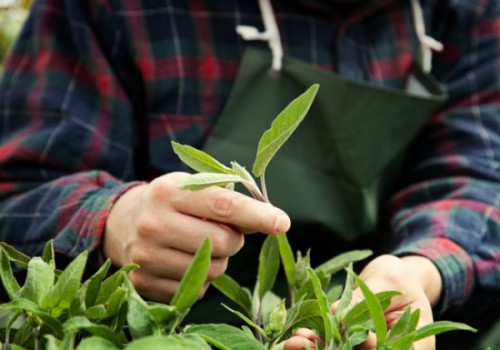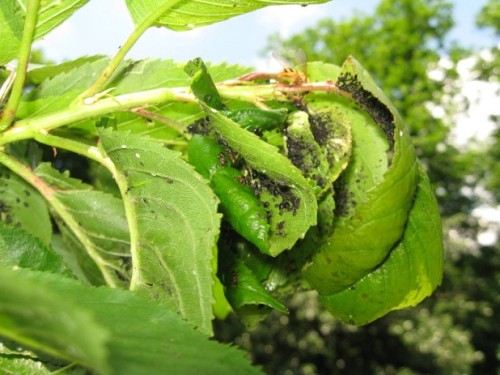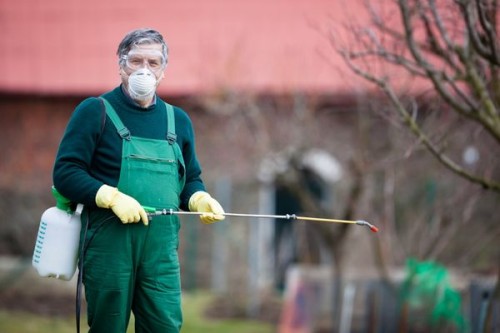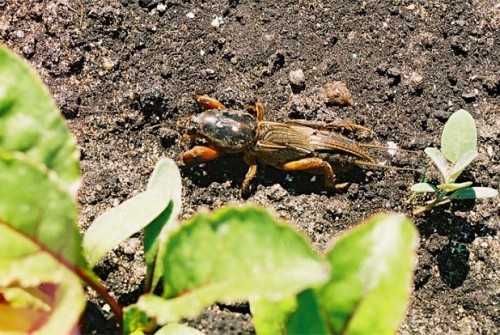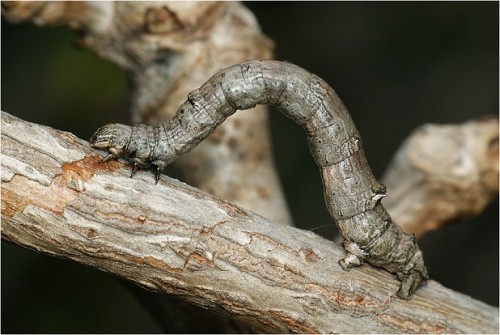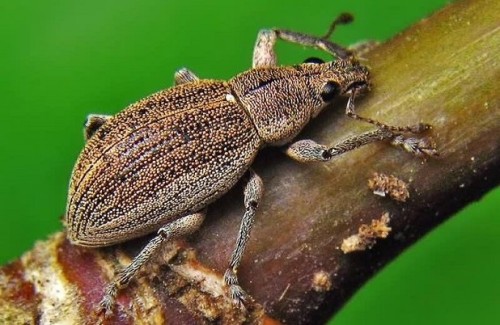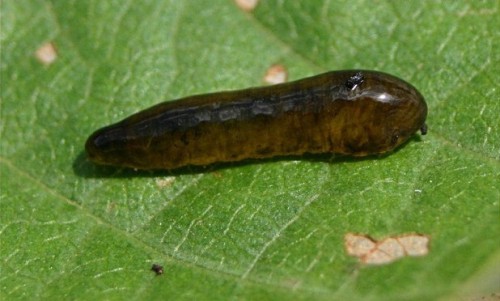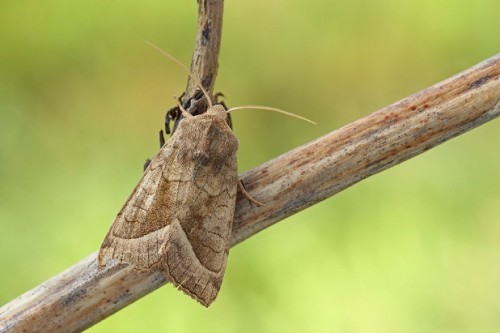Each gardener knows that to obtain good harvesting vegetable crops or fruits, it is important not only the quality of the planting material, the properties of the soil, the correct watering mode, but also the fight against pests. Various insects, rodents, weeds can deliver a lot of hassle and "short-clicking" all attempts to get a good harvest.
In order for pests to not cause problems, it is necessary to warn them on time. The fight against insects, which "serve" annual and perennial plants, as well as weeds - should be systemic. It is impossible to process the Garden of the "Killy" dose of pesticides and calm down on this. In this case, you can apply more harm to plants than before processing. The struggle against pests is a whole system, each of the steps of which must be performed on time. Next, we will look at how to deal with malicious insects, which most often destroy the harvest of vegetables and fruits.
Content
Vegetable garden without pests. General rules of struggle
As we said, the most important thing in the fight against pests is to prevent the problem. It is necessary at least once a week to inspect the leaves of trees and shrubs, as well as the surface of the bark of trees for the presence of malicious insects. Inexperienced gardeners pay attention to the problem only when it already comes out, for example, when the leaves sent to the caterpillars will begin. In this case, it is already too late to take any effort and a plant can perish.
There is a certain order of seasonal pest control to prevent their harmful effects on plants in the garden:
- Immediately after the melting of snow cover, the garden must be removed from the rotting fruit left from spring, leaves and plant residues. It is better, of course, to do it late in the fall so that in the spring, the amount of unnecessary material in the garden is minimal. The fact is that the remnants of rotting vegetation and leaves are an ideal place to develop harmful insects and microorganisms that may cause the disease.
- After swelling, the kidneys in the trees comes the time to combat weevil. These minor bugs who are very loved by the bark and the leaves of the trees, winter on the surface of the fallen leaves, and it is important that they will not get into the crown in the spring. For this put traps with glue at the foot of the strain.
- May is the time to treat plants against a flue dew.
- Against the appearance of the paste, the cause of which can be fallen in autumn leaves, trees in the spring are treated with fungicide-based solutions.
- So that the tree does not suffer from the life of a silkworm, apple moth, hawkering or leafpers, it must be processed before the appearance of buds.
Biological methods to combat pests
The popularity of such methods is a relatively low cost of work and less harmful influence on plants from the chemical elements. Also, at the expense of its safety for soil, plants and their fruits, treatment with biological preparations and decoctions can be carried out even during crop maturation. At the same time, the high rate of decay of biological preparations is the key to their safety.
Conditionally such methods can be divided into several approaches:
- Spraying by biologically active substances and decoctions from plants.
- Attraction of insects and animals in the garden to combat pests.
- Installation of barriers and traps to prevent pests to plant.
To increase the effectiveness of the fight against insects and other types of pests of fields and gardens, you must remember the care of the soil. Timely application of fertilizers, additives, the constant soil mulch will reduce the likelihood of the development of harmful microorganisms or insects. It is also necessary to remember the disinfection of the garden tool so as not to do not disseminate the pests in the garden.
The brazers are mainly prepared from the following components:
- Calendula.
- Chamomile.
- Celandine.
- Needles.
- Long husk.
- Garlic and other plants.
Plants or their flowers are collected in dry weather and dried. Then brew them on boiling water, filter and leave to cool. Next, the decoction is diluted with water and spraying garden crops. If necessary, the procedure must be repeated in a week. It is worth noting that, despite the relative safety of biological sprayers, with them you also need to work carefully, as with chemical. Special attention should be paid to the consistency of the beam. After all, if you go over, you can create a lot of problems. In addition, it should not spray healthy plants, limit only those who got sick. It is worth remembering about pollinators who significantly increase the yield of cultures. Therefore, the spraying work must be carried out either early in the morning or late in the evening. To make events more successful, it is necessary to determine which insects pests of fields and vegetable gardens caused plant disease.
Recently, preparations have recently been obtained, which in their composition have pheromones that attract a certain type of insect or birds to combat pests. For example, chalcides or riders are perfect for the fight against caterpillars, and ladybugs perfectly destroy TRU, ticks or whiteflies. For the fight against the tool, zlatlasons are also attracted, which are very likely to smell aster and yarrow ordinary. Very helpful in the plan of struggle with pests is a mantis.
Among the birds, the true friends of the garden are Dyatla, Orioles, Sparrows. For their involvement in the trees, nestings are installed, feeding feeders. To protect young plants from flying insects, special fabric covers apply.
Chemical ways to combat pests
Under the chemical methods of combating harmful insects, there is an introduction to the soil or spraying plants with special chemicals that are destroying effect on pests.
As for the use of chemistry in the fight against diseases and pests of the garden and the garden, then the opinions were divided in two. Opponents of such methods argue that vegetables or fruits treated with special preparations in food are dangerous and culture must confront pests themselves. On the contrary, chemical processing defenders think. They believe that without it, the plants are more likely to die, not to mention a good crop, and the means of struggle do not have a negative impact on the human body.
Biologists and agrotechnology scientists believe that without chemical and biological methods of struggle to grow, it is almost impossible to grow, however, the rules for their use should be followed. It is impossible to pour a narrow-minded garden with pesticides and hope for a wonderful result. Work on the care of plants should be comprehensive and timely.
Chemical preparations whose action is aimed at combating pests and weeds, called pesticides. They are divided into several main groups:
- Insecticides-acaricides. These chemical preparations are used against ticks and insects that harm the garden. As a rule, they kill insect eggs, and also actual on adults.
- Fungicides are chemicals whose goal is to combat fungi and harmful bacteria.
- Herbicides. Such drugs are used to combat weeds.
The use of these funds is carried out in several ways:
- Spraying. The most frequently used method for making pesticides on the household plot. It allows you to evenly distribute the drug on the crown of plants or soil surface. Perform this operation using mechanical or electrical sprayers.
- Pollination. Apply for large crops on industrial scales.
- Making pellets into the soil or powders with a substance. More often used to combat pests in the soil of vegetable garden, such as the Medveda, field mouse or mole.
- Poisoning bait. In this case, in the bait with a substance that attracts the pest is added to the poison. In this way, often struggling with mice, adding several poisoned grains to the cereals.
Fighting pests of vegetable
Aphid. The trouble is small insects that feed on the juice of the leaves of the plant, inflicting them by irreparable damage. In addition, the insect may be a conveyor of harmful diseases. Ladybugs are considered the most important enemy of Tli, which successfully destroy it. That is why they need to treat them carefully, try not to sigh. Chemical treatment against TIRs spend 3 times a season. The first time - when installing warm weather, the second - 2 weeks after the first, and the third one after the end of the flowering of the plant. In no case cannot be processed during flowering plants. Successfully fighting with aphid planning near the vegetable crops of a special camomile variety - Pyrethrum.
Pyel. A small insect pest pest, which is powered by berries, leaves of almost all plants. "Work" of the Piller You can face with cherry berries, who have a sluggish pulp of the fetus and mucus on the bone. The pyllick can cause not only the death of the crop, but also plants. The fight against it lies in spraying a tree with special insecticides.
Earth ants. These are insects that cause significant harm to the roots of plants. The struggle against earthy ants pests of the garden is to process the place of their cluster with special drugs.
Pryenitsa. The most common type of caterpillars, which eats both herbaceous and fruit cultures. You can deal with them using special traps and spraying with chemicals. If their quantity is not too large, you can hope on birds and not to carry out. As a rule, it works. The prevention of the appearance of caterpillars in the garden is to the timely cleaning of fallen foliage, in which dolls love.
Drosophila. Small fleets that multiply in the residues of the crop, not cleaned from the field. Very love juice of fruit and vegetable plants. To prevent their appearance on the site, it is necessary to get rid of the residues of the crop, rotten branches, foliage. In addition to damaging plants, these insects are rotten carriers, which can cause the death of plants. When a drosophyl appears in the garden, it is necessary to urgently spray with special drugs.
Snails. Snails destroy the plants of cabbage, radish, radish, as well as grape leaves. They struggle with them with the treatment of a plot with lime mixtures or solutions with the content of ground pepper and tobacco dust. By the way, such solutions reduce the acidity of the soil, preventing the appearance of rot.
Pest of gardens: Photo


